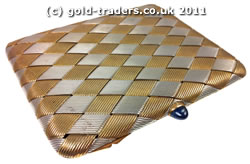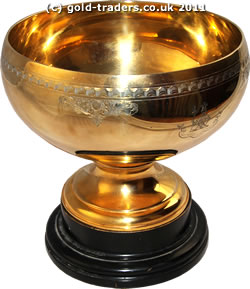
If this gold cigarette case had sold at auction for the top-end estimate, the seller would have been approx. £794 worse off compared to the amount we paid.
If you have a high value item and have decided to sell it, you’ll be looking at what options are available to you. One consideration is to sell it at auction.
Just to make things clear, I’m not referring to online auctions in this article. Online actions introduce a whole range of additional issues, which may get discussed in anther post. This post looks at the merits of selling gold, platinum or silver via a any reputable bricks and mortar auction house.
Sellers Fees
Auction houses make their money charging a buyer’s premium and a seller’s fee. As the name suggests, the sellers fee is payable by the seller. The amount payable is based on the final sale value of the item, calculated a percentage, usually around 20 – 25%. The auction fees also attract VAT at the standard prevailing rate.
The buyer’s premium is added to the final auction price and is paid over to the auction house by the buyer. For the purposes of this example, we don’t need to account for it.
Here are a couple of recent examples to illustrate our point.
Last week, we purchased this 18ct gold basket weave cigarette case. It’s mid 20th century, French with a cabochon sapphire button release. After purchasing it, we had it professionally valued by a specialist dealer who has many years experience and has worked for some of the top auction houses around the world.
His appraisal, “With the current high price of precious metals on the commodity markets, the value will be almost if not entirely based on its weight.”
Auctioneers valuation: £3,500
Sellers fee + VAT: £840
Estimated payout to customer: £2,660
Amount paid by Gold-Traders: £3,454.33
So, assuming the case had sold at the top estimate and the auctioneer charged just 20% sellers fee, the seller would have been over £794 worse off at auction.

This gold rose bown was sold to us after the seller calculated they would receive less money at auction.
The above example is by no means uncommon. This solid 9ct rose bowl was purchased by us after the customer calculated they would be significantly worse off by selling at auction.
This doesn’t just apply to gold items. With the current high prices for silver and platinum, we’re also receiving many more large items, such as silver tea sets, cutlery and platinum watches.
If you’re thinking of selling an item at auction, why not give us a call for a no-obligation valuation? We can usually provide a valuation over the telephone and we have no hidden fees or charges at all. The rates we quote are the rates we pay.

